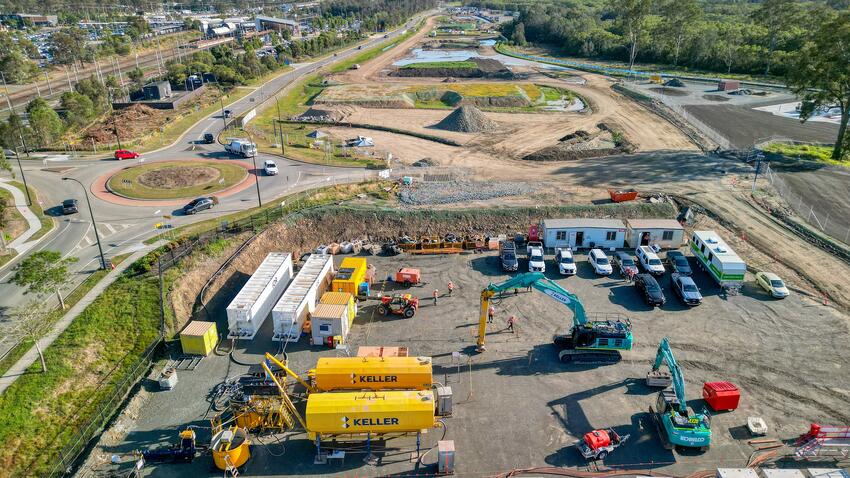Keller Australia is bringing its mass mixing expertise and a highly collaborative approach to support the construction of a major new motorway in Queensland.

One of Queensland’s largest infrastructure projects, the Coomera Connector is a proposed 45km motorway connecting Logan City with the increasingly popular Gold Coast. Running parallel to the existing M1 Pacific motorway, the new road will relieve congestion, shorten travel times and improve safety.
The motorway is being built in two stages. The first, a 16km southern section, is currently underway, with Keller playing an integral role by carrying out ground improvement works on the central segment.
After winning a competitive tender from the client, the Fulton Hogan Hull McIlwain joint venture, Keller will eventually complete around 150,000m3 of mass mixing (MSM) to strengthen soft clays for the road’s embankments, culverts and reinforced soil slope walls.
Openness and trust
“The client chose us due to our demonstrated capacity to effectively resource the project and our willingness to share valuable technical expertise in MSM, supporting the project’s quality assurance objectives,” says Tony Eid. “Another key factor was our agreeing to a collaborative contract model, which encourages greater openness and collaboration.
“Openly detailing how we intended to construct and price the project based on actual costs and risk profiles builds trust. It also aligns with our transparent approach to delivery and cost and risk management.”
Although it’s a construct-only contract, the Keller team has played a pivotal role in shaping the MSM specifications.
“Before starting on site, we collected numerous soil samples and conducted an extensive programme of lab trials, determining soil composition in each area where the MSM is required,” explains Mashhood Akhter, Project Manager. “Then, working closely with the client's designers, CGC, and drawing on our local and global expertise, we established the specific mix strength for every location.”
“This also involved taking into account the type of structure the ground needs to support and the level of organics in the soil. High levels of organics require a higher binder content to be effective. We then carried out field trials to corroborate the lab tests.”
An agile, collaborative approach
Keller started full production on site in September 2024 – with the scale of the project requiring three batch plants and five rigs – and is scheduled to finish in September this year.
Throughout the project, the crew has maintained an agile, collaborative approach as new scopes of work have been added and removed, and sequences changed to reflect the client’s requirements. There have also been challenging inclement periods and a cyclone to navigate.
But it’s not just the site team that’s ensuring the project stays on track – Keller’s maintenance yard has provided critical support to keep plant equipment running smoothly and rapidly deal with any issues.
“It’s been a challenge for them, but the yard team have been fantastic,” says Mashhood. “In fact it’s been a brilliant effort by everyone involved so far. We’re continuing to collaborate with the client on every aspect of the project and we look forward to completing our scope in the next few months.”